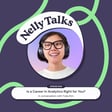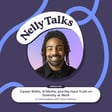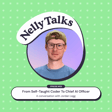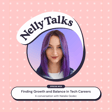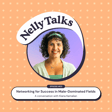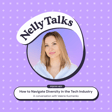
#06 | How to Find Balance, Lead, and Love Your Career - Heeru Sajnani
In this episode of NellyTalks, Heeru Sajnani shares her journey as a research director and consumer psychologist, balancing leadership and life as a working mum.
From unexpected career pivots to mastering the art of storytelling through data, Heeru offers insights into what it takes to thrive in the world of qualitative research. Tune in to hear her advice on navigating career challenges, finding balance, and embracing the power of peer support.
Timeline:
00:00 Nelly Talks Intro
00:54 Meet Heeru Sajnani
01:39 How did you get into the world of research?
05:22 Do you think good researchers need qualitative and quantitative skills?
07:02 What do you enjoy most about your role?
09:06 Do you feel this career allows you to have a good work life balance?
12:48 Do you feel like there is more representation in your field now?
16:51 What are your thoughts on AI?
19:34 Are there any other technologies in your field that you're excited about?
20:59 Have you ever considered a career pivot?
22:40 What advice would you give to your younger self?
Key Takeaways:
Embrace career pivots. Heeru’s journey from psychology to qualitative research shows that career changes can lead to unexpected success when you follow your interests.
Master the art of storytelling. As a researcher, Heeru emphasises how weaving data into compelling stories can create impactful insights and better decision-making.
Find your work-life juggle. Instead of chasing perfect balance, Heeru highlights the importance of finding a way to juggle the demands of both career and family.
Leverage peer support. Heeru’s career growth was shaped by the encouragement of her peers and the empowering environment she found in her current leadership role. Surrounding yourself with a supportive community is key.
Let us know what guests you'd like us to interview in future episodes!
